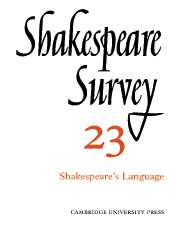Book contents
- Frontmatter
- Shakespeare and the Tune of the Time
- Some Functions of Shakespearian Word-formation
- Guide-lines for Interpreting the Uses of the Suffix ‘-ed’ in Shakespeare’s English
- Shakespeare’s Use of Colloquial Language
- Words, Action, and Artistic Economy
- ‘Antony and Cleopatra’: the Limits of Mythology
- Shakespeare’s ‘War with Time’: the Sonnets and ‘Richard II’
- Shakespeare and Christian Doctrine: Some Qualifications
- Shakespeare’s Poets
- The Text of Coleridge’s 1811–12 Shakespeare Lectures
- Shakespeare Studies in German: 1959–68
- A Neglected Jones/Webb Theatre Project: ‘Barber-Surgeons’ Hall Writ Large
- Interpretation or Experience? Shakespeare at Stratford
- 1 Critical Studies
- 2 Shakespeare’s Life, Times, and Stage
- 3 Textual Studies
- Index
- Plate section
Shakespeare’s ‘War with Time’: the Sonnets and ‘Richard II’
Published online by Cambridge University Press: 28 March 2007
- Frontmatter
- Shakespeare and the Tune of the Time
- Some Functions of Shakespearian Word-formation
- Guide-lines for Interpreting the Uses of the Suffix ‘-ed’ in Shakespeare’s English
- Shakespeare’s Use of Colloquial Language
- Words, Action, and Artistic Economy
- ‘Antony and Cleopatra’: the Limits of Mythology
- Shakespeare’s ‘War with Time’: the Sonnets and ‘Richard II’
- Shakespeare and Christian Doctrine: Some Qualifications
- Shakespeare’s Poets
- The Text of Coleridge’s 1811–12 Shakespeare Lectures
- Shakespeare Studies in German: 1959–68
- A Neglected Jones/Webb Theatre Project: ‘Barber-Surgeons’ Hall Writ Large
- Interpretation or Experience? Shakespeare at Stratford
- 1 Critical Studies
- 2 Shakespeare’s Life, Times, and Stage
- 3 Textual Studies
- Index
- Plate section
Summary
The plausibility of a close connection between Shakespeare’s Sonnets and his English history plays has long been recognized. The Tragedy of King Richard II in particular is one of the very first works to be noticed in several of the tables of parallels which, at various times, have been drawn up by students of the Sonnets for dating purposes. It is the first and, in fact, the only one of the ‘histories’ to be mentioned—after six other Shakespearian plays or poems—in Tucker Brooke’s edition of the Sonnets. Yet, though—as Professor Mahood says—‘the present trend of criticism is bringing Shakespeare’s poems and his plays together’, Richard II has received little attention from critics concerned with this kind of approach. Miss Mahood herself, whose penetrating essay starts from a consideration of the ‘sun/cloud’ metaphor in Sonnet 33, soon dismisses as less significant the occurrence of the same metaphor in Richard II, iii, iii, 62–8, to dwell upon that in 2 Henry IV, i, ii, 220–6, and upon its context in both Henry IV plays. A similar emphasis is traceable in T. W. Baldwin’s The Literary Genetics of Shakespeare’s Poems and Sonnets and J. W. Lever’s The Elizabethan Love Sonnet.
In 'Time's Subjects: The Sonnets and King Henry IV, Part II Professor L. C. Knights shows the same preference still more clearly. His point is that 'the sense of life's tragic issues' came to Shakespeare as 'a heightened awareness of what the mere passage of time does to man and all created things'. And just as
there are many of the Sonnets that show the impact of time and mutability on a nature endowed with an uncommon capacity for delight . . . it is surely no accident that one of the first plays in which we recognize the great Shakespeare—the second part of King Henry IV— is a play of which the controlling theme is time and change.
- Type
- Chapter
- Information
- Shakespeare Survey , pp. 69 - 78Publisher: Cambridge University PressPrint publication year: 1970



